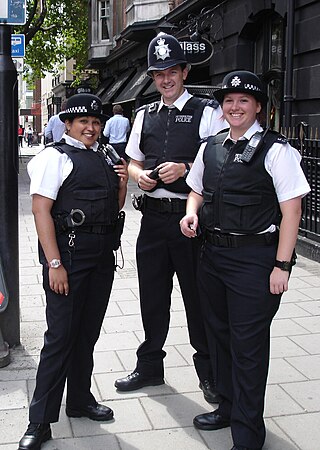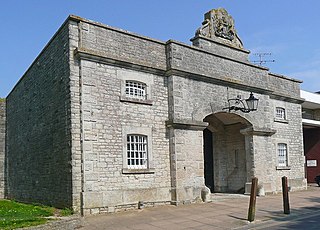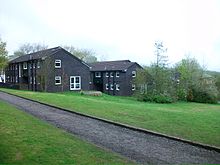
Spanking is a form of corporal punishment involving the act of striking, with either the palm of the hand or an implement, the buttocks of a person to cause physical pain. The term spanking broadly encompasses the use of either the hand or implement, though the use of certain implements can also be characterized as other, more specific types of corporal punishment such as belting, caning, paddling and slippering.

A corporal punishment or a physical punishment is a punishment which is intended to cause physical pain to a person. When it is inflicted on minors, especially in home and school settings, its methods may include spanking or paddling. When it is inflicted on adults, it may be inflicted on prisoners and slaves, and can involve methods such as whipping with a belt or a horsewhip.

Law enforcement in the United Kingdom is organised separately in each of the legal systems of the United Kingdom: England and Wales, Scotland, and Northern Ireland. Most law enforcement duties are carried out by those who hold the office of police constable of a territorial police force.

A borstal was a type of youth detention centre in the United Kingdom, several member states of the Commonwealth and the Republic of Ireland. In India, such a detention centre is known as a borstal school.

Caning is a form of corporal punishment consisting of a number of hits with a single cane usually made of rattan, generally applied to the offender's bare or clothed buttocks or hands. Caning on the knuckles or shoulders is much less common. Caning can also be applied to the soles of the feet. The size and flexibility of the cane and the mode of application, as well as the number of the strokes, may vary.

Birching is a form of corporal punishment with a birch rod, typically used to strike the recipient's bare buttocks, although occasionally the back and/or shoulders.

The tawse, sometimes formerly spelled taws, is an implement used for corporal punishment. It was used for educational discipline, primarily in Scotland, but also in schools in a few English cities e.g. Newcastle upon Tyne, Gateshead, Liverpool, Manchester and Walsall.
A reformatory or reformatory school is a youth detention center or an adult correctional facility popular during the late 19th and early 20th centuries in Western countries. In the United Kingdom and United States, they came out of social concerns about cities, poverty, immigration, and gender following industrialization, as well as from a shift in penology to reforming instead of punishing the criminal. They were traditionally single-sex institutions that relied on education, vocational training, and removal from the city. Although their use declined throughout the 20th century, their impact can be seen in practices like the United States' continued implementation of parole and the indeterminate sentence.

Caning is a widely used form of corporal punishment in Singapore. It can be divided into several contexts: judicial, prison, reformatory, military, school and domestic. These practices of caning as punishment were introduced during the period of British colonial rule in Singapore. Similar forms of corporal punishment are also used in some other former British colonies, including two of Singapore's neighbouring countries, Malaysia and Brunei.

Slippering is a term for the act of smacking the buttocks, or the hands, with a slipper or a slide as a form of corporal punishment. A slippering on the buttocks is a form of spanking; it is a much more common method than slippering on the hands. The verb "to slipper" means "to give a slippering". Slipperings are particularly associated with Britain and Commonwealth countries, although not exclusively so.
The Vandalism Act 1966 is a statute of the Parliament of Singapore that criminalizes a number of different acts done in relation to public and private property, namely, stealing, destroying or damaging public property; and, without the property owner's written consent, writing, drawing, painting, marking or inscribing on property; affixing posters, placards, etc., to the property; and suspending or displaying on or from the property any flag, banner, etc.

Corporal punishment is banned in the penal and education systems of the Republic of China (Taiwan), but there are no laws banning its use in the home. However, as of 22 March 2023, there is a draft amendment of Article 1085 of the Civil Law that may make some forms of corporal punishment in the home illegal if it comes into effect.

Caning is used as a form of corporal punishment in Malaysia. It can be divided into at least four contexts: judicial/prison, school, domestic, and sharia/syariah. Of these, the first is largely a legacy of British colonial rule in the territories that are now part of Malaysia, particularly Malaya.

The Sexual Offences Act 1956 is an Act of the Parliament of the United Kingdom that consolidated the English criminal law relating to sexual offences between 1957 and 2004. It was mostly repealed by the Sexual Offences Act 2003 which replaced it, but sections 33 to 37 still survive. The 2003 Act also added a new section 33A. These sections create offences to deal with brothels.

School corporal punishment is the deliberate infliction of physical pain as a response to undesired behavior by students. The term corporal punishment derives from the Latin word for the "body", corpus. In schools it may involve striking the student on the buttocks or on the palms of their hands with an implement such as a rattan cane, wooden paddle, slipper, leather strap, belt, or wooden yardstick. Less commonly, it could also include spanking or smacking the student with an open hand, especially at the kindergarten, primary school, or other more junior levels.

Judicial corporal punishment is the infliction of corporal punishment as a result of a sentence imposed on an offender by a court of law, including flagellation, forced amputations, caning, bastinado, birching, or strapping. Legal corporal punishment is forbidden in most countries, but it still is a form of legal punishment practiced according to the legislations of Brunei, Iran, Libya, the Maldives, Malaysia, Saudi Arabia, Singapore, the United Arab Emirates, Yemen, and Qatar, as well as parts of Indonesia and Nigeria.
The powers of the police in England and Wales are defined largely by statute law, with the main sources of power being the Police and Criminal Evidence Act 1984 and the Police Act 1996. This article covers the powers of police officers of territorial police forces only, but a police officer in one of the UK's special police forces can utilise extended jurisdiction powers outside of their normal jurisdiction in certain defined situations as set out in statute. In law, police powers are given to constables. All police officers in England and Wales are "constables" in law whatever their rank. Certain police powers are also available to a limited extent to police community support officers and other non warranted positions such as police civilian investigators or designated detention officers employed by some police forces even though they are not constables.
The Isle of Man is a Crown Dependency located in the Irish Sea between the islands of Great Britain and Ireland with a population in 2015 estimated to be approximately 88,000. It enjoys a high degree of domestic, legislative and political autonomy through its ancient Parliament Tynwald. By convention, the United Kingdom Government is responsible for the conduct of the international relations and defence of the island. The Isle of Man does not have a written constitution, or a Bill of Rights which sets out its Human Rights. These rights are addressed in the Human Rights Act 2001. The island has also ratified a number of international treaties.
The legality of corporal punishment of children varies by country. Corporal punishment of minor children by parents or adult guardians, which is intended to cause physical pain, has been traditionally legal in nearly all countries unless explicitly outlawed. According to a 2014 estimate by Human Rights Watch, "Ninety percent of the world's children live in countries where corporal punishment and other physical violence against children is still legal". Many countries' laws provide for a defence of "reasonable chastisement" against charges of assault and other crimes for parents using corporal punishment. This defence is ultimately derived from English law. As of 2024, only three of seven G7 members and seven of the 20 G20 member states have banned the use of corporal punishment against children.
The school strikes of 1911 were a series of mass walkouts of schoolchildren in the United Kingdom, protesting against corporal punishment and poor conditions in schools. Originating in Llanelli, in Wales, at least 62 towns across the UK saw school strikes in September 1911.







